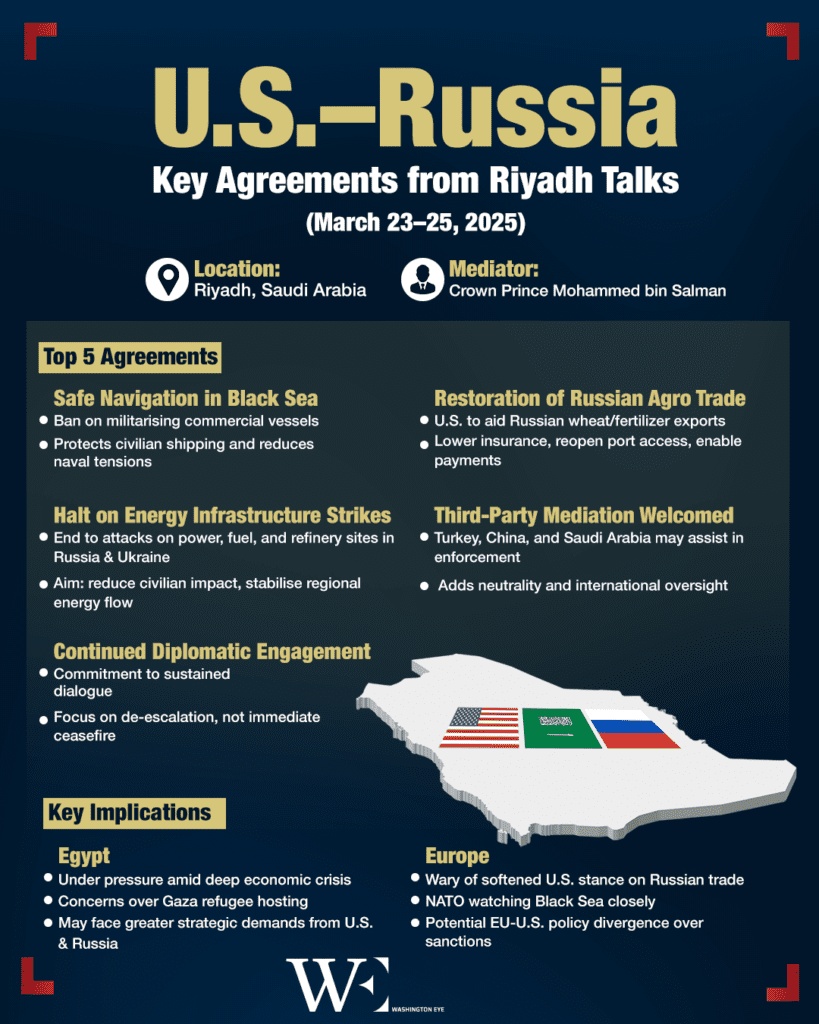In a major diplomatic development, the United States and Russia have reached a series of agreements designed to enhance maritime security in the Black Sea, revive Russia’s global agricultural exports, and protect critical energy infrastructure amid the ongoing Russia-Ukraine conflict. These outcomes followed expert-level talks held in Riyadh, Saudi Arabia, from March 23 to 25, building on high-level discussions between U.S. President Donald J. Trump and Russian President Vladimir Putin. The negotiations were mediated by Saudi Crown Prince Mohammed bin Salman, whose role in brokering the dialogue is being viewed as a significant contribution to efforts aimed at de-escalation and long-term conflict resolution.
A central agreement from the talks focuses on ensuring safe commercial navigation in the Black Sea, a region that has seen escalating naval confrontations since the onset of the war in 2022. The U.S. and Russia pledged to prevent the militarization of civilian vessels, banning their use for logistical or offensive military operations. This measure aims to reduce the risk of further escalation in maritime zones, where commercial vessels have often become unintended targets or been repurposed for war-related activities. The deal is intended to uphold international maritime norms and safeguard vital shipping lanes from being drawn into the conflict.
In a move that surprised many observers, the United States agreed to support the restoration of Russia’s agricultural and fertilizer exports to global markets. While broader sanctions imposed on Moscow remain in place, Washington will facilitate lower maritime insurance costs and improve port access and payment systems for Russian cargo. These actions are aimed at stabilizing global food supply chains that have been disrupted by the conflict and associated trade restrictions. Given Russia’s role as a leading exporter of wheat and fertilizer, the resumption of these exports is expected to ease pressure on global food prices and enhance food security, particularly in vulnerable regions.
The talks also produced a commitment to halt military strikes on energy infrastructure in both Ukraine and Russia. Since the early stages of the war, repeated attacks on power plants, fuel depots, and refineries have led to severe energy disruptions, affecting millions of civilians. Under the new agreement, both nations will work to prevent further targeting of energy facilities. This marks a significant step toward reducing civilian suffering and ensuring a degree of energy stability in the region. Monitoring and verification mechanisms will be established to oversee the implementation of this agreement, which remains fragile given the ongoing hostilities.
Both sides also welcomed third-party mediation to help enforce and sustain the newly reached agreements. Countries with strong diplomatic ties to both Washington and Moscow—such as Turkey, China, and Saudi Arabia—are likely to play key roles in supporting implementation. Saudi Arabia’s involvement reflects its growing influence in global diplomacy, particularly in conflict mediation. Riyadh’s successful hosting of the talks cements its position as a credible intermediary capable of facilitating dialogue between geopolitical rivals.
While these agreements do not constitute a ceasefire, they signal a renewed commitment to diplomatic engagement. President Trump emphasized the need for an end to violence on both sides as a foundation for future peace. With the war continuing into its third year, these talks represent a pragmatic step toward managing the conflict’s most dangerous aspects. They suggest that while a comprehensive peace settlement may remain distant, incremental agreements can help mitigate its global consequences and build momentum for broader dialogue.
The role of Saudi Arabia in convening the talks was acknowledged with gratitude by the United States, underscoring the kingdom’s evolving position as a key diplomatic actor. Saudi officials highlighted the need for regional stability, particularly given the war’s impact on global energy and food security. However, the exclusion of Ukraine from these negotiations has sparked concerns in Kyiv, where officials fear that certain concessions—such as easing restrictions on Russian exports—may undercut Ukrainian defense efforts. Ukrainian authorities are expected to seek assurances from Washington that their strategic interests will be safeguarded.
Reactions in Europe are also expected to be mixed. NATO allies and EU member states have maintained firm support for Ukraine and strict sanctions on Russia. Any U.S. move that appears to relax pressure on Moscow could prompt calls for clarification and coordination. European officials are likely to scrutinize the agreements closely to ensure they align with broader transatlantic strategies for confronting Russian aggression.
Economically, the decision to facilitate Russian agricultural exports could have immediate and widespread effects. Russia’s return to the global market may help stabilize commodity prices and ease food insecurity, but it also poses a geopolitical challenge. Countries that oppose Moscow’s actions may question whether such moves inadvertently enable the Kremlin to rebuild economic strength amid a war it initiated.
The long-term impact of the Riyadh agreements will depend on how effectively they are implemented. Key next steps include establishing verification protocols to ensure that commercial vessels are not used for military purposes, developing secure channels for agricultural trade that do not breach broader sanctions, enforcing commitments to protect energy infrastructure, and broadening diplomatic engagement to include Ukraine and European partners. While the agreements mark progress, their success will be measured by tangible reductions in violence and sustained cooperation on key issues.
Ultimately, the Riyadh talks have produced a notable shift in the dynamics of the Russia-Ukraine conflict. They underscore the importance of regional diplomacy, with Saudi Arabia playing an increasingly central role in global peace efforts. As implementation begins, the world will be watching to see whether this fragile diplomatic breakthrough can hold—and whether it will pave the way for broader solutions to one of the most entrenched conflicts of the 21st century.














